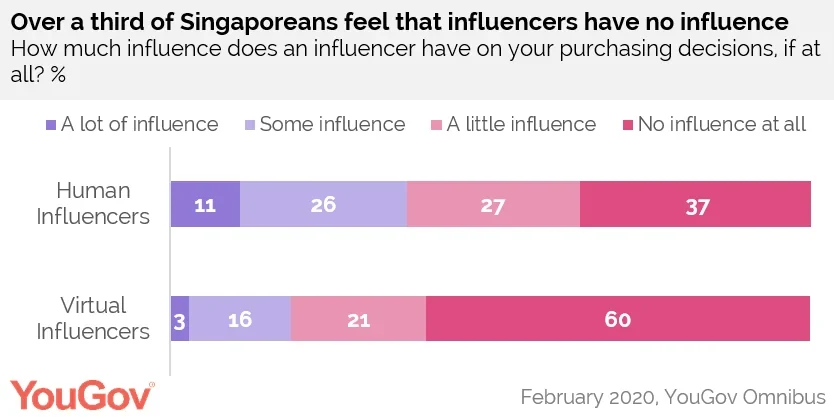A third have no trust in influencers altogether
In a social media crazy age, a new breed of influencers have emerged to compete for the attention of consumers. Latest YouGov research looks at what Singaporeans think about influencers – human or otherwise.
Two-thirds (67%) of Singaporeans have an active Instagram account. Among those aged 18 to 24, over nine in ten (94%) are on Instagram. The likelihood of having Instagram account decreases by age. While three quarters (76%) of those aged 35 to 44 are on Instagram, this drops to over two in five (44%) for those age 55 and above.
Of those who are on Instagram, about half (49%) follow influencers. Younger Singaporeans (aged 18 to 34) are three times more likely to follow influencers than older Singaporeans (aged 55 and above) (63% vs. 21%). What qualifies someone as an influencer in the eyes of Singaporeans? An expert level of knowledge or social influence (51%), high-quality content (50%) and a large social media following (48%) are the top three criteria.
Virtual influencers are computer-generated models, with a strong following on social media platforms, particularly Instagram. Though virtual influencers only began to gain popularity last year, a quarter (25%) of Singaporeans are already familiar with the term. Middle-aged Singaporeans (aged 35 to 44) are the most likely to have heard of virtual influencers, and older Singaporeans (aged 55 and above) are the least likely (33% vs. 17%). Less than one in ten (8%) are currently following virtual influencers on Instagram.
How much influence do influencers really have on Singaporean consumers purchasing decisions? For over a third (37%) of Singaporeans, human influencers have no influence at all. One in ten (11%) think they have ‘a lot’ of influence, about a quarter (26%) think they have ‘some’ and the remaining quarter (27%) think they have ‘a little’. Virtual influencers have even less influence, with three in five (60%) stating they have no influence at all.

Overall, almost seven in ten (68%) have some degree of trust in a product endorsed by influencers. About a third (32%) have no trust at all. Looking at the level of trust for a human influencer and a virtual influencer, over two in five (44%) instil the same degree of trust in both. Half (51%) trust virtual influencers less than human ones. The remaining 6% trust virtual influencers more, with men twice as likely as women to trust them (8% vs. 4%).
***Results based on 1,111 Singaporeans surveyed on YouGov Omnibus








